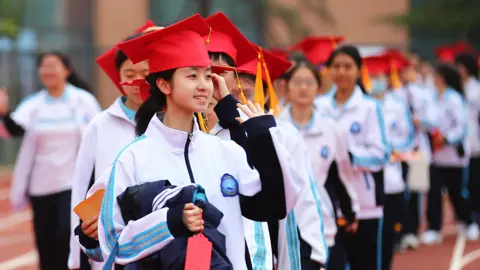 Getti images
Getti imagesXiao Chen appeared in the American consulate in Shanghai on Thursday, after Washington announced that it would “Aggressive” revoke visas to Chinese students.
The 22-year-old was a visa meeting: she was sent to Michigan in the fall of studying communications.
After the “pleasant” conversation, she was told that her application was rejected. She didn’t give her a reason.
“I feel like drifting ducks are thrown in the wind and storm,” she said, using the usual Chinese term that used to describe the feeling and uncertain and helpless.
She hoped because she had already had a letter of acceptance. And she thought it was closely escaped the bombs in the last days.
First, the Donald Trump administration moved to the end Possibility of Harvard University to enroll in International Studentsa move that has been blocked since then in court. And then it said she had quit Visa terms For all sides of the students.
But now Chen is ready for Plan B. “If I can’t get a visa in the end, I’ll probably wait to see if things will get better next year.”
The valid visa is still not enough, it adds, because students with visas can “stop at the airport and deport.”
“It’s bad for every Chinese student. The only difference is how bad it is.”
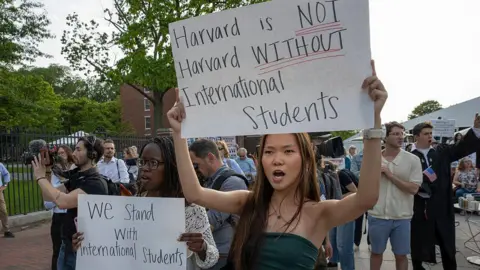 Getti images
Getti imagesIt was a dark week for international students in the United States – and perhaps even stronger for 280,000 or so Chinese students who would notice that their country was separated.
Homeland Secretary of Security Christ Noem accused Harvard about “coordination with the Chinese Communist Party”.
State Secretary Marko Rubio said that the move of Chinese students in the United States would include “those with connections with the Chinese Communist Party or studying in critical fields”.
It could hit a wedding wedding from them given membership in the Communist Party is common among officials, entrepreneurs, business people, and even artists and familiar people in China.
Beijing called it a “politically motivated and discriminatory action”, and his ministry of foreign affairs filed a formal protest.
There was a time when China sent the largest number of foreign students to American campuses. But these numbers slipped like a relationship between the two countries.
Stronger and all the more logged Beijing is now conflicting with Washington for superiority in just everything, from trade to technique.
Trump was the first expression already written problems for Chinese students. He signed the order in 2020. years of banning Chinese students and researchers with bonds for the Peki Army to reach American visas.
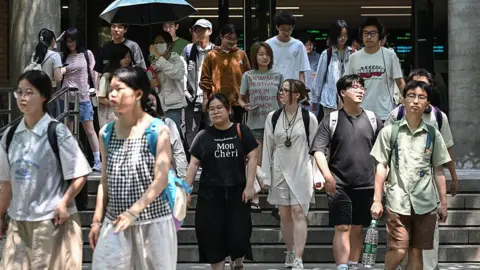 Getti images
Getti imagesThis order remained in place during the belt of President Joe Biden. Washington never clarified what represents the “links” of the army, so many students had their own Visas has been revoked or were rejected in US boundaries, sometimes without an appropriate explanation.
One of them, who did not want to be appointed, said his visa was canceled by customs and border protection (CBP) when he landed in Boston in August 2023. years.
It is accepted in a post-doctoral program at Harvard University. He wanted to study regenerative medicine with a focus on breast cancer, and made a master’s degree from a military exhaust research institution in China.
He said that he was not a member of the Communist Party and his research had nothing to do with the army.
“They asked me what the link between my research and Chinese defense affairs,” then he said to the BBC. “I said, how could breast cancer have anything to do with the National Defense? If you know, tell me.”
He believes he never stood a chance because officials have already decided. He reminded one of them by asking, “Is Xi Jinping bought his suitcase for you?”
What was surprisingly, or even shocking, slowly turned normal, because more and more Chinese students were fighting to ensure visas or reception to study science and technology at American universities.
Mr. Cao, the main psychology whose research involves neuroscience, she spent the past of the school year applying for doctoral programs in the United States.
He graduated from premium universities – credentials that could send it to Ivi League school. But more than 10 universities applied, only one extended the offer only.
Trump’s cuts for biomedical research did not help, but distrust about Chinese researchers was also a factor. Spies, especially in the sensitive entities, in recent years, in recent years, in recent years, were referred to Chinese citizens in American nationalities in recent years, even break down some careers.
“One of the professors even told me,” We rarely give bids to Chinese students these days, so I can’t give you an interview, “said Mr. Cao BBC in February.
“I feel like I’m just a grain of sand under the wheel of time. I can’t do anything.”
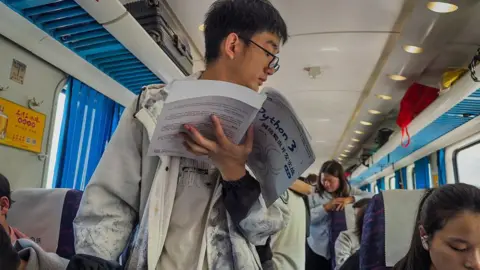 Getti images
Getti imagesFor those who graduated from American colleges, not returning home in China was not easy.
They used to be fed up as a bridge to the rest of the world. They now find that their former diploma do not draw the same reaction.
Chen Jian, who did not want to use his real name, said he quickly realized that his undergraduate graduate study from the American College became an obstacle.
When he returned 2020 for the first time. Year, he interned in the State Bank and asked for supervisors if there was a chance to stay on.
The supervisor did not say that he said directly, but Chen received a message: “Employees should have local diplomas. People like me) will not even receive an answer.”
He later realized that “there was really no colleague with an abroad of undergraduate backgrounds in the department.”
He returned to the United States and gave his master at Johns Hopkins University, and now he works in Chinese technological giant Badit.
But despite the degree of the prestigious American University, Mr. Chen does not feel that he has an edge due to the rigid competition from graduates in China.
What also did not help doubts about foreign graduates. Beijing has introduced warnings of foreign spies, so that civilians say they are looking for suspicious figures.
In April, the Chinese Business Woman Dong Mingzhu told shareholders at the closed door meeting that her company, the home apparatus of Gree Electric, will never recruit Chinese people who were educated abroad “because they were spies.
“I don’t know who is and who is not,” Mrs. Dong said, in the comments that leaked and went online.
Days later, the CIA published promotional videos by encouraging Chinese officials dissatisfied with the government to become spies and provide classified information. “It’s your destiny in your own hands,” Video said.
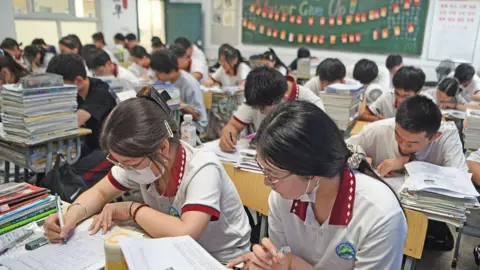 Getti images
Getti imagesThe suspicion of strangers like the United States and China are further withdrawn from each other is a surprisingly reversal for many Chinese people who remember growing up in a very other country.
Zhang Ni, who also did not want to use his real name, says “Very shocked” MS Dong’s announcements.
The 24-year-old is a recent journalism graduate at Columbia University in New York. He says “he doesn’t care about working in Grees,” but what was surprised by the shift in attitudes.
That there are so many Chinese companies “doesn’t like anything that could be related to international contrast from what Ms. Zhang adult – childhood” filled out (in conversations are at) Olympics and world exhibitions. “
“Whenever we saw the strangers, Mom would push me to talk to them to practice my English,” she says.
This readiness for the exchange of ideas and learning from the outer world seems to be decreasing in China.
And America, once the place that drew so many young Chinese, is no longer welcome.
Looking back, Mrs. Zhang can’t help, but I remember joking that her friend made a farewell dinner before she went to the United States.
Then the flippy comment, now is missing fear in Washington and Beijing: “Don’t become a spy.”
Additional reporting Kelly NG






